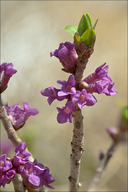|
|
click photo for larger file

Daphne mezereum
Mezereon
|
Photographer: Dr. Amadej Trnkoczy
ID: 0000 0000 0715 0768 (2015-07-11)Copyright © 2015 Dr. Amadej Trnkoczy
|
|
INFORMATION PROVIDED WITH THE PHOTO
|
date of photo May 11, 2015
latitude 46.43705 longitude 13.63949
View on Google Maps.
location
Mt. Mangart region, Mangart's flats, road side of Mt. Mangart Alpine tool road, from the last tunnel to the beginning of the end road loop, East Julian Alps (Posočje, Slovenia)notes Slo.: navadni volčin - Habitat: stony alpine grassland, road side, skeletal ground; southwest oriented mountain slope; open, sunny and dry place; calcareous ground, exposed to direct rain, elevation (all three observations) from 1.800 m (6.000 feet) to 2.000 m (6.500 feet), average precipitations ~ 3.000 mm/year, average temperature 0 - 2 deg C, alpine phytogeographical region. - Substratum: soil among stones and rocks. - Cmment: Daphne mezereum is our most common species of Daphne genus. It is frequent in mixed and Fagus sylvatica forests and along wood edges. One can find it from lowland up to subalpine elevations. As most of our other Daphne members its flowers have strong and pleasant fragrance. Frequently, when walking in the woods, one detects it with his nose before with his eyes. Flowers develop early in spring before the leaves fully develop. - At low elevations its habitus is a small to medium size bush, sparsely branched, with most of its leaves at the end of these branches. The bush is up to 1.5 m tall, sometimes up to 2 m. - At high elevations it looks much differently. It is much smaller, dense, half round habitus plant with many densely arranged branches of approximately the same length. Flowers appear very early when the leaves just start to appear. Later, in early summer, it becomes a low, rounded woody plant with much denser foliage than in the valleys. In autumn it is again beautiful with its bright red, but deadly poisonous berries. At high elevations it usually grows solitary or in groups of just a few plants. - Ref.: (1) M.A. Fischer, W. Adler, K. Oswald, Exkursionsflora Österreich Liechtenstein, Südtirol, LO Landesmuseen, Linz, Austria (2005), p 600. (2) A. Martinči et all., Mala Flora Slovenije, Tehnična Založba Slovenije (2007) (in Slovene), p 377. (3) H. Haeupler, T. Muer, Bildatlas der Farn- und Blütenpflazen Deutschlands, Ulmer (2000), p 324. (4) D. Aeschimann, K. Lauber, D.M. Moser, J.P. Theurillat, Flora Alpina, Vol. 1., Haupt (2004), p 960.camera Nikon D700 / Nikkor Micro 105mm/f2.8
contributor's ID # Nikon D700 / Nikkor Micro 105mm/f2.8 photo category: Plant - annual/perennial
|
MORE INFORMATION ABOUT THIS PLANT
|
| common names
Mezereon (photographer)
View all photos in CalPhotos of Daphne mezereum Check Google Images for Daphne mezereum |
|
The photographer's identification Daphne mezereum has not been reviewed. Sign in to review or comment on this photo |
|
Using this photo The thumbnail photo (128x192 pixels) on this page may be freely used for personal or academic purposes without prior permission under the Fair Use provisions of US copyright law as long as the photo is clearly credited with © 2015 Dr. Amadej Trnkoczy.
For other uses, or if you have questions, contact Dr. Amadej Trnkoczy amadej.trnkoczy[AT]siol.net. (Replace the [AT] with the @ symbol before sending an email.) |
|
|
